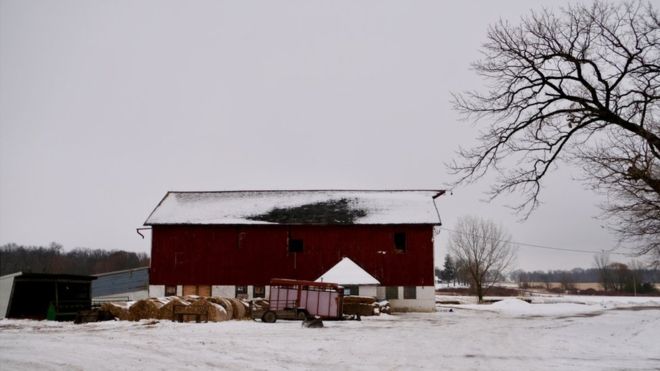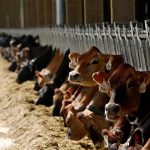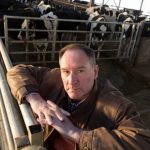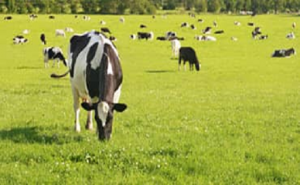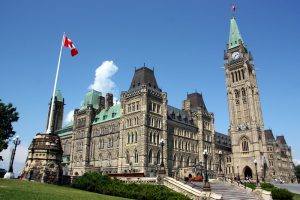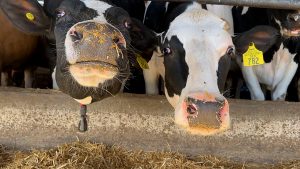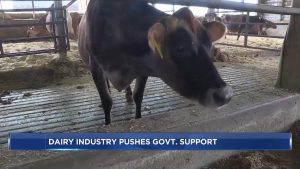
A summary of the new agreement says that Beijing will now “strive” to purchase an additional $5bn (£3.8bn) of US agricultural products over the next two years.
“That will result in greater prosperity for farmers all across the land,” Mr Trump said as he signed the agreement.
But farmers in Wisconsin – the swing state proudly billed as America’s Dairyland – remain uncertain. And as the president seeks re-election, that could matter.
In 2016, Mr Trump clinched the state by a 0.8% margin, becoming the first Republican to do so since Ronald Reagan in 1984.
In Wisconsin, such a razor’s-edge victory is typical.
In three of the five past presidential elections, victory in Wisconsin has been decided by less than one percentage point. In 2000, this margin was made up of 6,000 votes, in 2004 about 13,000.
Farmers make up about 11% of the electorate in Wisconsin, says Charles Franklin, director of the state’s leading poll at Marquette Law School.
“They’re a modest bloc,” Mr Franklin says. But even a modest bloc “could be responsible for tipping a one-point election”.
So how are farmers feeling about the future?
‘It’s a slow death’
“Every year you lose a few farms, every year you lose a few farmers who don’t want to keep doing this,” says Will Hsu, president of Hsu Ginseng, a ginseng farm in central Wisconsin’s Marathon County.
The region is reliably Republican – Marathon County went for Trump over Clinton by an 18 point margin in 2016 – and is home to more than 95% of the United States’ ginseng, almost all of which is shipped to China.
In the 1990s there were 1,000 ginseng farmers in Wisconsin, Mr Hsu says, growing more than 2m lbs of ginseng.
“There are only about 180 farmers left,” he says. “It’s death by a thousand cuts.”
It’s hard work. Ginseng takes three to five years to reach maturity and cannot be farmed on the same land twice.
And it’s been made harder by the trade war, Mr Hsu says, which has pushed tariffs up from 8% to 38%, a punishing reality for farmers who rely on Chinese consumers for their survival.
Many farmers are bearing costs themselves – lowering prices to offset the added tax.
It’s not quite devastation, he says, but the pressure on farmers is building.
“It’s a slow death,” he says.
Hsu’s criticism of the president’s trade war has raised eyebrows from some in his community, he says.
“I hear from a lot of farmers who say I’m a little too vocal against Trump’s policies, that I should be supportive of him.”
But even though Hsu might support Trump ideologically, “there’s also the realistic part of me,” he says. And “realistically, it’s hurting everyone and our pocketbooks.”
‘Farmers are always the pawns’
Joel Greeno, 52, grew up on a dairy farm in Monroe County in west Wisconsin. It was “pretty much assumed” he would continue the family tradition, he says.
In 1990, he did, buying a 160 acre dairy farm and 48 cows of his own.
But after twenty years of business, staring down economic ruin, he was forced to sell.
“It was just excruciating,” he says.
To Mr Greeno, who now farms vegetables in addition to nightshifts at Wisconsin’s Ocean Spray cranberry factory, Mr Trump’s trade war has added needless stress to an already fragile industry.
For years, Wisconsin has led the US in farm bankruptcies. In 2019, the state lost one in 10 of its dairy farms, marking the biggest decline on record.
Exports of US dairy products to China declined by over 50% in 2019, and the US Dairy Export Council estimated last year that retaliatory tariffs from China could cost US dairy farmers $12.2bn by 2023 if they remain in place.
“Tariffs only hurt us,” he says. “There was no thought process whatsoever.”
He continues: “Our labour is stolen, our lives are stolen, our families are broken and it’s all because we have politicians who are absolutely clueless to the reality of farming.”
“Farmers are always the pawns.”
‘Ray of hope’
“We’ve dealt with declining prices before, but it hasn’t lasted this long before,” Katy Schultz says as she walks through the barn at Tri-Fecta farms, the 400-cow dairy farm she owns with her two siblings just outside of Fox Lake.
The US-China trade war added “insult to injury” during a difficult period for farmers, she says. “It was already not great times and not great prices.”
“I won’t sugar coat that… We struggled. We struggled with everyone.”
In the weeks before the agreement was signed, people in her community had been talking about the possibilities of a new deal. For some, Mr Trump’s promises gave them a “ray of hope” to hang on through difficult conditions.
Just one door over from 2,000 acres, a neighbour boasts a towering flag pole on the front lawn, adorned with a massive Trump 2020 flag. It’s not unexpected in Dodge County – which went for Trump in 2016 by a 30-point margin.
Ms Schultz doesn’t say who she voted for, disclosing only that her siblings were “divided” at the ballot box.
“I don’t care if they’re Democrat or Republican. I just want to know that they’re rowing in the same boat that I am,” Ms Schultz says. But there are some things the president has done that “you can’t really deny”, like the record-low unemployment rate.
“Is [the deal] the answer to everything? Probably not,” she says. But, “I think there’s some optimism now.”
